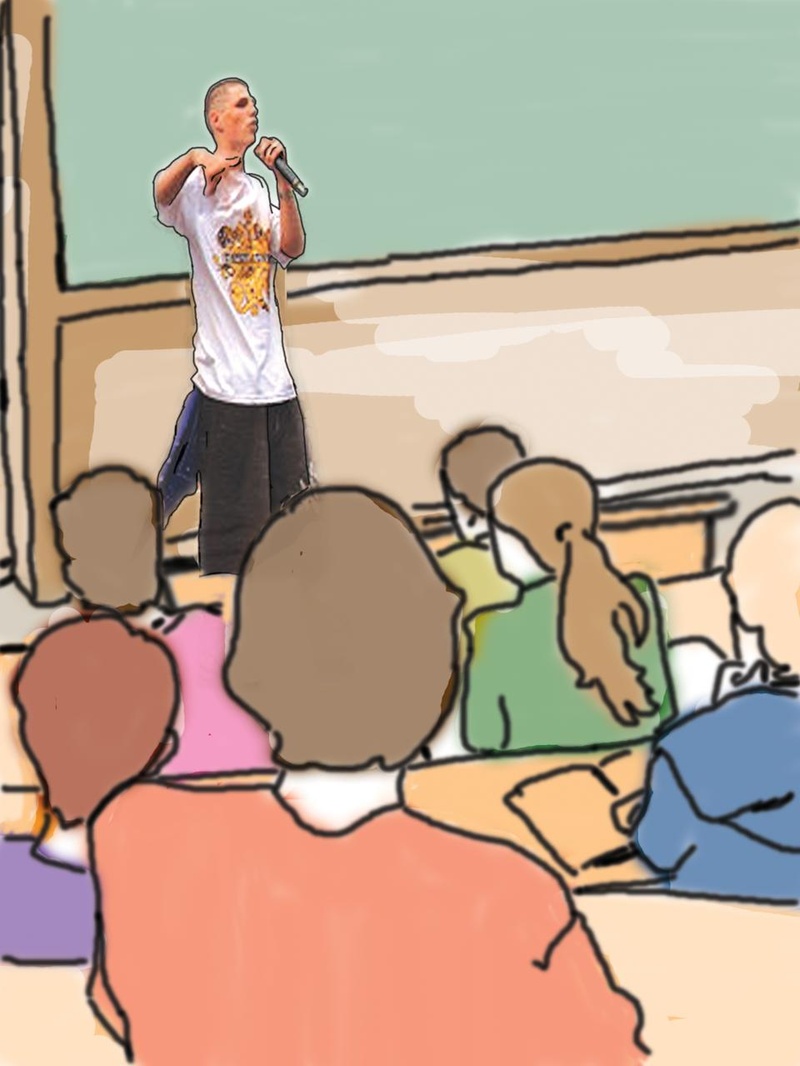The Hiphop Archive looks less like a research space and more like a well-kept living room. The walls are lined with numerous display cases, one for VHS tapes, one for books, and one for action figures. Sleeves of old vinyl hip-hop records run along the baseboards.
A big couch and a couple of chairs face a large flat-screen television. A few of the archive’s student research assistants lounge around, writing papers on their laptops or listening to hip-hop. Above the television, on a shelf, sits a collection of iconic hip-hop paraphernalia: a turntable, multicolored cans of spray paint, a boom box. A fully functional DJ station resides in one corner.
The space is, in short, hip. It feels perfectly suited for the work its researchers are doing: It is not so buttoned up as to be stifling, nor is it relaxed enough to imply that what goes on here is anything less than serious scholarship.
It may seem incongruous to devote an academic research center to a popular art form such as hip-hop, but the location of the Hiphop Archive itself is even more so: Harvard University. The Hiphop Archive ultimately raises question about the art form itself. What lies beneath the surface of this popular entertainment to merit such focus? Why does the Hiphop Archive belong within the ivy-covered walls of Harvard?
FEMINIST FEMCEES
A slideshow on the wall of Ticknor Lounge scrolls through pictures of female hip-hop artists. Some are posed modestly, like Queen Latifah, and others provocatively, like Nicki Minaj.
This display is the background for a discussion entitled “Feminism and Hip-hop,” hosted by the Association of Black Harvard Women, Latinas Unidas de Harvard College, and the Harvard College Women’s Center. The event is a part of Women’s Week 2012 and exemplifies the type of scrutiny that hip-hop receives at Harvard. The genre is typically examined through the lens of another theory; this afternoon, it is feminism.
Marcyliena Morgan, a professor of African and African American studies who directs the Hiphop Archive, moderates the discussion. Morgan begins the event by listing of female archetypes in hip-hop: the intelligent but frigid woman, the “sister with attitude”, the lesbian femcee. A central question underlies the discussion: How can love of hip-hop be rationalized with its rampant misogyny?
This question meets an uncomfortable pause. Morgan eases up, instead asking the students to consider what the ideal hip-hop feminist role model would be. Then the discussion takes off. The students rattle off their conceptions of this role model; she is independent, introspective; she has agency, self-respect, and confidence.
One student points out that this hypothetical woman is defined by her relationship to men. And then the discussion tackles men’s role in women’s objectification in hip-hop. The students question whether this approach—men leading efforts against misogyny—is inherently problematic or even entirely effective.
The lively discussion needs little moderation from Morgan. The students’ engagement with the topic may be due to the bare skin popping up on the wall of the lounge, but perhaps the cause for clamor is the potential for analysis and debate over rap music.
BEAT AND PULSE
Feminism is just one of many lenses used to examine hip-hop. The fields run the gamut in the social sciences and humanities, and the intersections can yield unexpected food for thought. Allyson M. Mcginty ’13, a student researcher at the Archive, is working on a junior project on homophobia and gender performance in hip-hop. Mcginty’s subject of study is probably more titillating than most: Nicki Minaj.
“I’m looking at whether Nicki Minaj’s hyper-sexuality through her body and her appearance promotes rigid gender types, and then whether that enforces ideas of homophobia within hip-hop,” Mcginty says. She is also examining Minaj’s gay male alter ego, Roman Zolanski, and whether her performance of a man plays into her hyper-sexuality or complicates it.
The overlap between hip-hop and social inquiry can also be found in Harvard’s classrooms. Laurence A. Ralph, an assistant professor of African and African American studies and anthropology, has designed an entire course with hip-hop in mind—African American Studies 102: “The Hip-hop Generation and Post-Civil Rights Black Politics.” Its curriculum does not focus solely on hip-hop, but the art form is deployed as a tool to examine how the younger generation responds to the expectations of the older generation.
Read more in Arts
Preview: Blind Boys of Alabama














